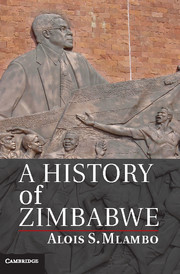Book contents
- Frontmatter
- Dedication
- Contents
- Figures
- Tables
- Maps
- Acknowledgements
- Timeline
- Notable Figures in Zimbabwean History
- 1 Introduction: Zimbabwe in Historical Perspective
- 2 Early States, c. 900–1900
- 3 The British Conquest State
- 4 Colonial Economy and Society to 1953
- 5 The Federation Years, 1953–1963
- 6 Nationalist Movements to 1965
- 7 Unilateral Declaration of Independence and African Response
- 8 Independent Zimbabwe, 1980–2000
- 9 The Crisis Years, 2000–2008
- 10 Conclusion: Zimbabwe Past, Present and Future Prospects
- Select Bibliography
- Index
- References
Select Bibliography
Published online by Cambridge University Press: 05 June 2014
- Frontmatter
- Dedication
- Contents
- Figures
- Tables
- Maps
- Acknowledgements
- Timeline
- Notable Figures in Zimbabwean History
- 1 Introduction: Zimbabwe in Historical Perspective
- 2 Early States, c. 900–1900
- 3 The British Conquest State
- 4 Colonial Economy and Society to 1953
- 5 The Federation Years, 1953–1963
- 6 Nationalist Movements to 1965
- 7 Unilateral Declaration of Independence and African Response
- 8 Independent Zimbabwe, 1980–2000
- 9 The Crisis Years, 2000–2008
- 10 Conclusion: Zimbabwe Past, Present and Future Prospects
- Select Bibliography
- Index
- References
- Type
- Chapter
- Information
- A History of Zimbabwe , pp. 261 - 274Publisher: Cambridge University PressPrint publication year: 2014



